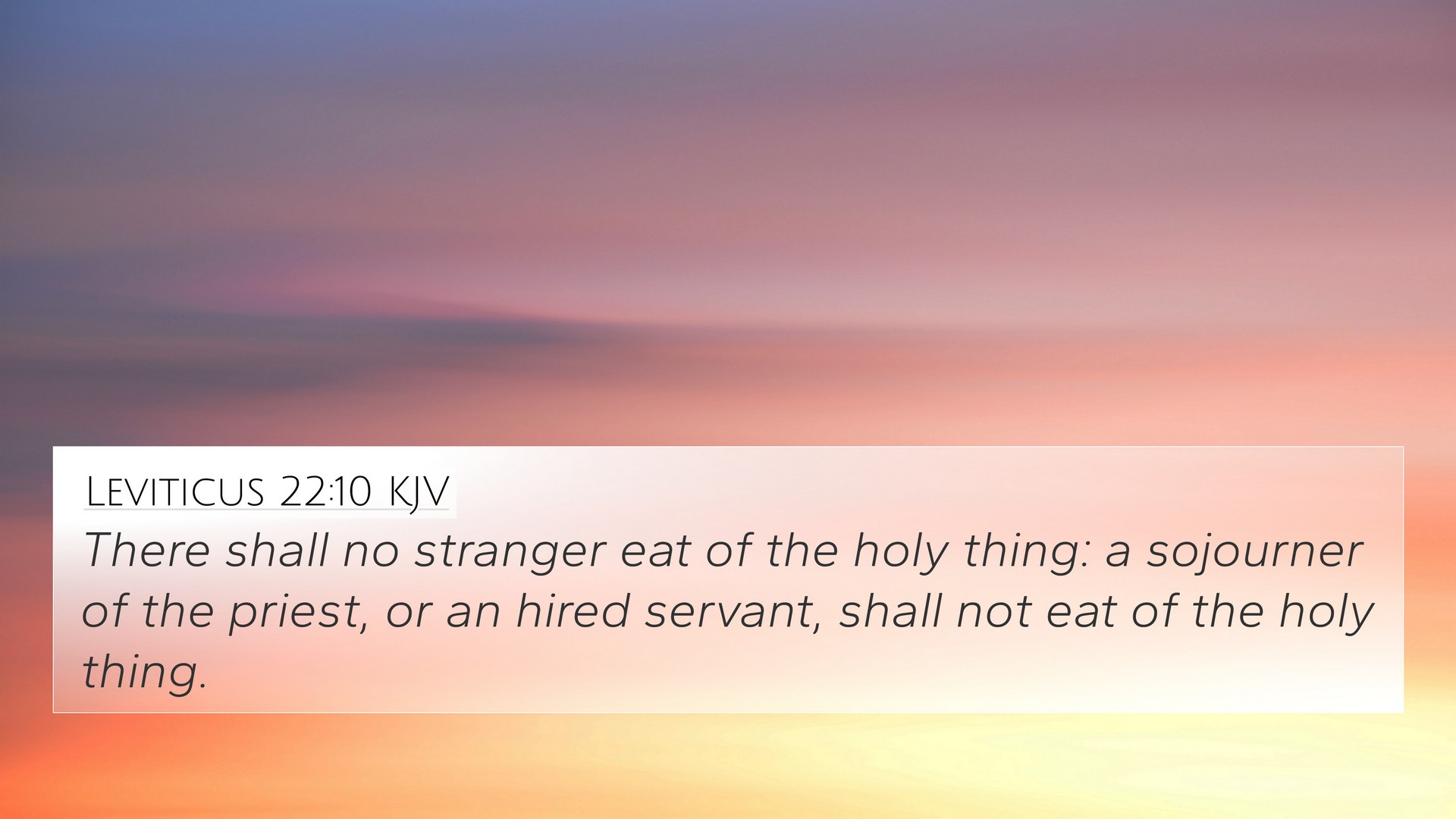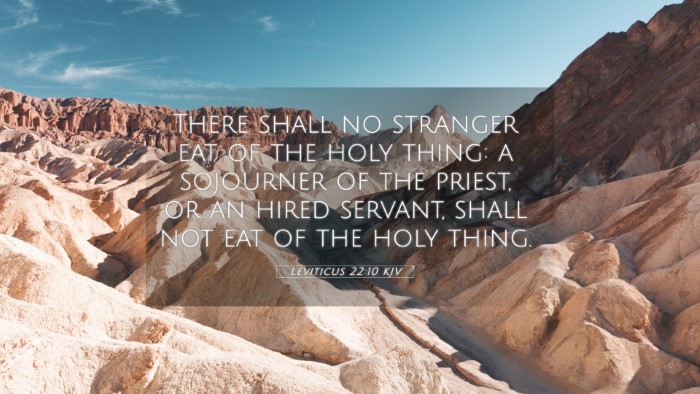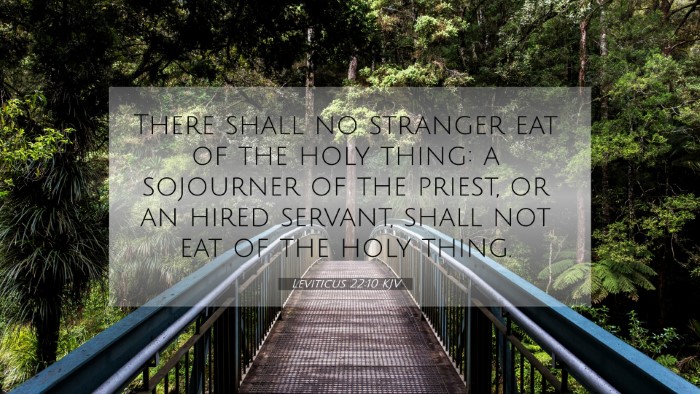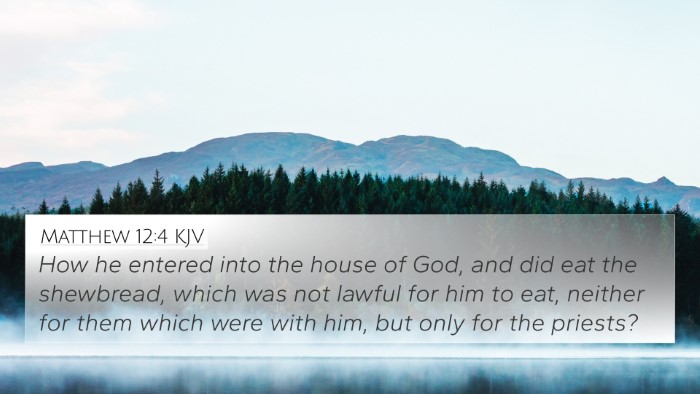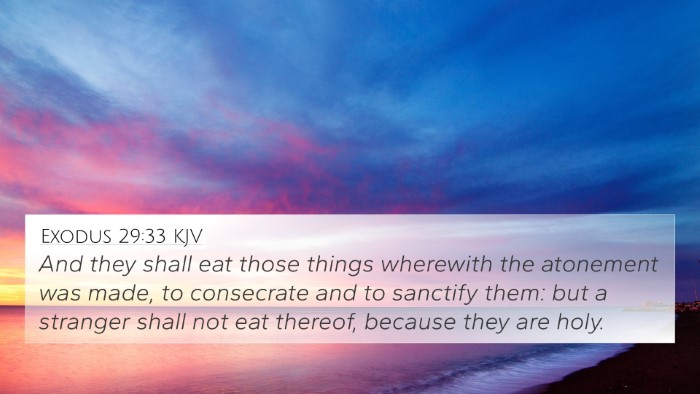Understanding Leviticus 22:10
Leviticus 22:10 states: "No person outside the priest's family may eat the sacred offering, nor may the guest of a priest eat the sacred offering." This verse highlights important regulations regarding the consumption of holy food, emphasizing the distinction between those who are set apart for religious service and those who are not.
Meaning and Insights
The insights derived from public domain commentaries, including those by Matthew Henry, Albert Barnes, and Adam Clarke, can be summarized as follows:
-
Matthew Henry:
Henry articulates the significance of maintaining holiness and purity among the priests and the offerings they receive. He suggests that this separation reflects God’s intention for His chosen people to remain distinct and sacred, indicating that only those designated by God have the right to partake in certain holy aspects.
-
Albert Barnes:
Barnes emphasizes the social and spiritual implications of these restrictions. He argues that by limiting the consumption of sacred offerings to priests and their households, the Lord establishes a clear boundary that upholds the sanctity of worship and the community’s understanding of spiritual authority.
-
Adam Clarke:
Clarke explains that this directive was meant to prevent any dilution of the sacredness of the offerings. Only those consecrated to God were permitted to partake, which enforced the serious nature of their roles and responsibilities. He notes that even guests of the priests were not permitted to share in these offerings unless they adhered to specific conditions.
Cross-References and Thematic Connections
This important verse aligns with several other scripture passages that deal with the theme of holiness, dietary laws, and the roles of priests:
- Exodus 29:33: Details the laws regarding the eating of the offerings by the priests, reinforcing the sanctity of the offerings.
- Numbers 18:10: Highlights that only the priests may eat the holy things, further establishing boundaries around what is considered sacred.
- Leviticus 10:13-15: Describes the importance of priests partaking of the offerings officially, emphasizing their unique role.
- Hebrews 7:14: Indicates that Jesus coming from the tribe of Judah, rather than Levites, reflects a new order of priesthood.
- 1 Peter 2:9: Illustrates that followers of Christ are now considered a "royal priesthood," allowing them access to God’s grace and holiness.
- Matthew 5:17-19: Jesus fulfills the law but upholds its importance, including adherence to holy practices.
- Colossians 2:16: Suggests that believers are no longer bound by food laws, symbolizing a shift in the understanding of holiness with the new covenant.
Implications for Modern Believers
For modern believers, Leviticus 22:10 serves as a reminder of the importance of recognizing and respecting spiritual authority and the conditions of holiness in relation to God. Understanding the context and implications of this verse can lead to a deeper appreciation of the sanctity of worship and community.
Guidance for Cross-Referencing Bible Verses
Engaging with cross-references within Scripture allows for a richer interpretation and understanding. Tools for Bible cross-referencing, such as concordances and cross-reference guides, are essential for studying the interconnectedness of Biblical texts.
- Using a Bible concordance can aid in finding keywords and themes across scriptures.
- Implementing a cross-reference Bible study method can help explore how different verses interact thematically.
- Establishing Bible chain references links various scriptures that support a singular message or theme.
Conclusion
In conclusion, Leviticus 22:10 emphasizes the importance of holiness and the careful measures that God established for His priests. By embracing the practice of cross-referencing Biblical texts, believers can discover profound connections and deepen their understanding of faith and practice. The study of thematic Bible verse connections like these not only enhances personal study but also enriches the communal understanding of God's word.
